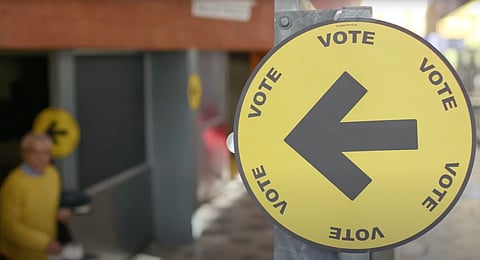

Despite being dubbed “the most important election of our lifetime,” one in three eligible voters chose not to cast a ballot in Canada’s recent federal election, prompting Democracy Watch to call for urgent reforms to strengthen democracy and increase voter engagement.
The watchdog group released a statement highlighting that the newly elected Mark Carney-led Liberal government secured 49% of the seats in the House of Commons with the support of just 30% of eligible voters.
The party won 169 of 343 seats, based on 44% of the votes cast — numbers that Democracy Watch argues raise serious concerns about the government’s democratic legitimacy.
"With one in three voters staying home, only 30% of eligible voters supporting the winning party, and three parties not electing the number of MPs they deserved to elect, alarm bells should be going off," said Duff Conacher, Co-founder of Democracy Watch.
He called on political leaders to immediately commit to a set of eight written rules to ensure fair operation of minority governments — a situation Canada has experienced six times in the last 20 years.
Voter turnout in the 2025 election hovered around 69%, only a marginal improvement over turnout in 1993, 1997, 2015, and 2019, and well below the 75% or higher levels commonly seen in elections of the 1970s and 1980s.
Democracy Watch also criticized Canada’s first-past-the-post voting system, which it says distorted the results.
The NDP earned 6.3% of the popular vote but just 2% of the seats (seven seats), while the Green Party received 1.2% of the vote but only 0.3% of the seats (one seat).
Under a proportional voting system, they would have received 22 and four seats respectively. Meanwhile, the seat and vote shares of the Conservatives and Bloc Québécois were more aligned.
To address these systemic issues, Democracy Watch is urging parties to adopt the following changes:
Enact an honesty-in-politics law that includes meaningful penalties for misleading voters.
Add “none of the above” as a ballot option, allowing voters to express dissatisfaction with all candidates.
Fix election dates and move them to the last Monday in October to better accommodate families and students.
Transition to a proportional representation system while ensuring local accountability.
Strengthen ethics, political finance, lobbying, and whistleblower protection laws.
Require transparent reporting of polling data and methodology to combat misinformation.
Mandate Elections Canada to spend its $5 million education budget on voter turnout messages such as “You never know when your vote may count” and “If you don’t vote, you don’t count.”
“These changes will make it easy and give voters many more compelling reasons to vote,” said Conacher, arguing that citizens are disillusioned after decades of broken promises, unethical governance, and unrepresentative outcomes.
Democracy Watch emphasized that these issues plague all levels of government across Canada. The group opposes mandatory or internet voting until democratic reforms are enacted and protections are in place, warning that both could create false legitimacy or risk election integrity.
